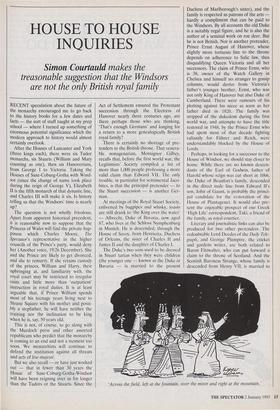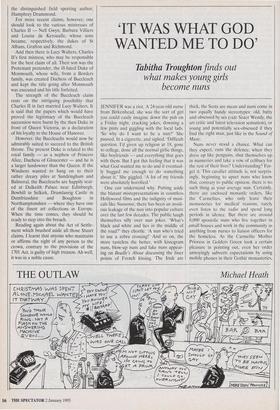HOUSE TO HOUSE INQUIRIES
Simon Courtauld makes the
treasonable suggestion that the Windsors are not the only British royal family
RECENT speculation about the future of the monarchy encouraged me to go back to the history books for a few dates and facts — the sort of stuff taught at my prep school — where I turned up something of enormous potential significance which the modern approach to history would almost certainly overlook.
After the Houses of Lancaster and York (three kings each), there were six Tudor monarchs, six Stuarts (William and Mary counting as one), then six Hanoverians, from George I to Victoria. Taking the Houses of Saxe-Coburg-Gotha with Wind- sor (since the change of name took place during the reign of George V), Elizabeth 11 is the fifth monarch of that dynastic line, and Charles III will make it six. Is history telling us that the Windsors' time is nearly up?
The question is not wholly frivolous. Apart from apparent historical precedent, it is reasonable now to suppose that the Princess of Wales will find the private hap- piness which Charles Moore, The Spectator's representative in the higher councils of the Prince's party, would deny her (Another voice, 19/26 December). She and the Prince are likely to get divorced, and she to remarry. If she retains custody of the princes, William and Harry, their upbringing at, and familiarity with, the royal court may be restricted to irregular visits and little more than 'outpatient' instruction in royal duties. It is at least arguable that, if Prince William spends most of his teenage years living next to Sloane Square with his mother and possi- bly a stepfather, he will have neither the training nor the inclination to be king when he is, say, 50 years old.
This is not, of course, to go along with the Murdoch press and other assorted republicans who predict that the monarchy is coming to an end and not a moment too soon. We monarchists will continue to defend the institution against all threats and acts of lese-majeste.
But we also recall — or have just worked out — that in fewer than 30 years the House of Saxe-Coburg-Gotha-Windsor will have been reigning over us for longer than the Tudors or the Stuarts. Since the Act of Settlement ensured the Protestant succession through the Electress of Hanover nearly three centuries ago, are there perhaps those who are thinking, 'That's enough Germans' and longing for a return to a more genealogically British royal family?
There is certainly no shortage of pre- tenders to the British throne. That venera- ble nonagenarian, Monsignor Gilbey, recalls that, before the first world war, the Legitimists' Society compiled a list of more than 1,000 people professing a more valid claim than Edward VII. The only trouble, in particular for sentimental Jaco- bites, is that the principal pretender — to the Stuart succession — is another Ger- man.
At meetings of the Royal Stuart Society, enlivened by bagpipes and whisky, toasts are still drunk to 'the Kim; over the water' — Albrecht. Duke of Bavaria, now aged 87, who lives at the Schloss Nymphenburg in Munich. He is descended, through the House of Savoy, from Henrietta, Duchess of Orleans, the sister of Charles II and James II and the daughter of Charles I.
The Duke's two sons used to be dressed in Stuart tartan when they were children (the younger one — known as the Duke in Bavaria — is married to the present Duchess of Marlborough's sister), and the family is respected as patrons of the arts — hardly a compliment that can be paid to the Windsors. By all accounts the old Duke is a suitably regal figure, and he is also the author of a seminal work on roe deer. But he is not British. Nor is another pretender, Prince Ernst August of Hanover, whose slightly more tortuous line to the throne depends on adherence to Salic law, thus disqualifying Queen Victoria and all her successors. The claim of Prince Ernst, who is 38, owner of the Watch Gallery in Chelsea and himself no stranger to gossip columns, would derive from Victoria's father's younger brother, Ernst, who was not only King of Hanover but also Duke of Cumberland. There were rumours of his plotting against his niece as soon as her father died in 1820. The family was stripped of the dukedom during the first world war, and attempts to have the title restored in 1948, by the Prince Ernst who had spent most of that decade fighting valiantly for Fiihrer and Reich, were understandably blocked by the Flouse of Lords.
Perhaps, in looking for a successor to the House of Windsor, we should stay closer to home. While there are no known descen- dants of the Earl of Godwin, father of Harold whose reign was cut short in 1066, the Duke of Beaufort's family, descended in the direct male line from Edward son, John of Gaunt, is probably the princi- pal candidate for the restoration of the House of Plantagenet. It would also pre- sent the enjoyable prospect of our Greek 'High Life' correspondent, Taki, a friend of the family, as royal courtier.
Literary and journalistic links can also be produced for two other pretenders. The redoubtable Lord Deedes of the Daily Tele- graph, and George Plumptre, the cricket and gardens writer, are both related to Baron Fitzwalter, who can put forward a claim to the throne of Scotland. And the Scottish Baroness Strange, whose family is descended from Henry VII, is married to
'Across the field, left at the fountain, over the moor and right at the mountain.' the distinguished field sporting author, Humphrey Drummond.
For more recent claims, however, one should look to the various mistresses of Charles II — Nell Gwyn, Barbara Villiers and Louise de Keroualle, whose sons became, respectively, the dukes of St Albans, Grafton and Richmond.
And then there is Lucy Walters, Charles II's first mistress, who may be responsible for the best claim of all. Their son was the Protestant pretender, the ill-fated Duke of Monmouth, whose wife, from a Borders family, was created Duchess of Buccleuch and kept the title going after Monmouth was executed and his title forfeited.
The strength of the Buccleuch claim rests on the intriguing possibility that Charles II in fact married Lucy Walters. It is said that the papers which would have proved the legitimacy of the Buccleuch succession were burnt by the then Duke in front of Queen Victoria, as a declaration of his loyalty to the House of Hanover.
However, the Buccleuchs would now be admirably suited to succeed to the British throne. The present Duke is related to the royal family — as a nephew of Princess Alice, Duchess of Gloucester — and he is a larger landowner than the Queen. If the Windsors wanted to hang on to their rather dreary piles at Sandringham and Balmoral, the Buccleuchs are happily seat- ed at Dalkeith Palace near Edinburgh, Bowhill in Selkirk, Drumlanrig Castle in Dumfriesshire and Boughton in Northamptonshire — where they have one of the finest art collections in Europe. When the time comes, they should be ready to step into the breach.
Reading again about the Act of Settle- ment which brushed aside all those Stuart claims, I learnt that anyone who maintains or affirms the right of any person to the crown, contrary to the provisions of the 1701 Act, is guilty of high treason. Ah well, it was in a noble cause.











































 Previous page
Previous page